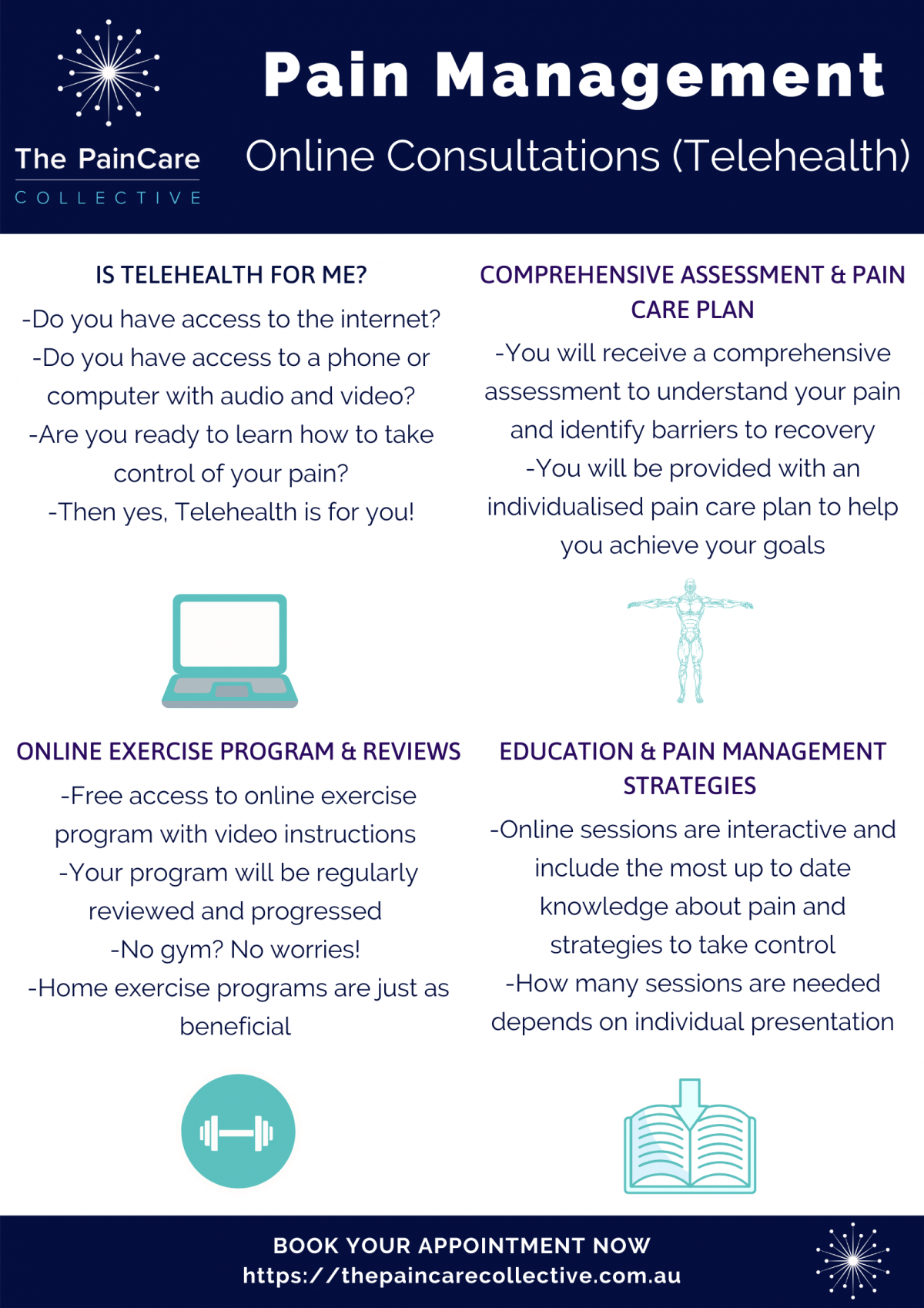Are you one of the 3.24 million Australians living with persistent pain?
Persistent pain (or chronic pain) is pain that persists for longer than 3 months after a surgery, an injury or from another cause. For those who experience persistent pain, it can be debilitating and distressing. In order to help you gain control of your pain and regain control in your life, it is important to address the whole experience of pain. So the most effective approaches for managing or caring for pain include medical, physical and psychological aspects.
With this is mind, The PainCare Collective offer the following services.
Pain Physiotherapy
Physiotherapy is an important part of helping you to understand pain and building your confidence to be able to lead an active life.
Pain Physiotherapy differs from traditional physiotherapy in that it takes a more ‘hands off’ approach, using education, goal setting and active management strategies that place you at the centre and ultimately empowers you towards self-management.
At The PainCare Collective, you will receive a comprehensive assessment to diagnose your pain condition and identify barriers to your progress. A mapped out pain care plan will be provided and you will have access to online communication and an interactive exercise program. We will work with you to set your baselines to activity and develop a plan to increase your capabilities as you work towards your goals.
Strategies used include educating about the process of pain and why hurt doesn’t always equal harm; understanding your pain behaviours and how you can use graded activity and pacing to your advantage; how to set goals and achieve them, whether that be return to work, returning to activities previously enjoyed or participating in something new; and how you can continue with pain care independently.
The Physiotherapists at The PainCare Collective work alongside you in a collaborative partnership to help you achieve your physical goals. You can expect to be listened to, believed, and respected.
Book your physiotherapy appointment now.

Pain Psychology
Psychological treatment is a very important part of helping you get back in control. It aims to help you get a clear understanding of the emotions, thoughts and behaviours that have developed along with your pain experience, and to help you to learn ways of coping so that you can regain the quality in your life. As well as helping you lessen the emotional impact of your pain, people frequently find that they can reduce the intensity of their pain by using psychological techniques.
When you see a pain psychologist “one on one”, there will be close attention to understanding your unique experience. There would be a discussion about your pain, how it affects you, where and when it occurs, and the things that make the pain better and those that make it worse. There will also be discussion about other worries and stresses, how these may be harder to deal with because of your pain, and how they may even make your pain worse. Your sleep patterns and routines will be discussed, as all of these things are known to be affected by the pain experience. Your psychologist will ask you to complete questionnaires that highlight the areas where you are needing help, and areas where you are doing well.
When working with people with persistent pain, psychologists from The PainCare Collective see people individually (in a one to one format), in group programs, and also alongside clinicians from other disciplines, such as physiotherapy.
Psychological treatment in the PainCare Collective is respectful. We know you are an individual with a unique experience, and that you have a lot of knowledge about your pain and how to deal with it. We will bring what we know, and we will listen to what you need.

Individual Assessment
At The PainCare Collective, you may have an assessment with a Physiotherapist, a Psychologist or both.
As part of of The PainCare Collective service, you will receive a comprehensive assessment and pain care plan. You may keep this to yourself or share with your other health professionals.
The assessment may be a one off appointment to support you and your current health professionals or as a second opinion consultation. Or you may continue with The PainCare Collective for a period of brief clinical intervention.
We also conduct diagnostic assessments for Complex Regional Pain Syndrome (CRPS). These assessments are with a physiotherapist and typically take 90 minutes. If a diagnosis of CRPS is made, education on management will be provided.

Brief Clinical Intervention
After an assessment, an individual may attend for further sessions with the Physiotherapist and/or Psychologist to address specific pain care goals.
This will consist of approximately 6 sessions spaced out over time. The focus will be on education, developing self-management strategies and goal attainment.
As part of the intervention, you will receive resources and online support to guide you towards independent pain care.
We request certain questionnaires be completed prior to attending to help us understand your pain and its impact on you. These questionnaires will be shared with you within the sessions and used to measure progress over time.

Telehealth
We recognise that accessing pain care services can be difficult, particularly for individuals who live in rural, remote and regional areas. The PainCare Collective is committed to ensuring individuals are not disadvantaged by where they live. Therefore, we offer individual services via Telehealth for follow up consultations and brief clinical interventions, allowing you to attend appointments via videoconference. Ideally, the initial assessment would be conducted face-to-face in order to appropriately assess and develop rapport with you. However, if this cannot be arranged in our clinic or at a clinic close to you, we will conduct the assessment online.
We also use online applications to communicate between our consultations to support clients with progression of exercises and pain care strategies. In addition, online questionnaires are used as a way of monitoring your progress.
The Telehealth consult can occur with you in your home, at your GP clinic or at another local healthcare venue.
Using Telehealth is easier than you might think. All you need is access to the internet and a communication device such as a smart phone, tablet or computer with a web camera. Telehealth appointments are as private as an in-rooms appointment. Measures are in place to ensure the communication is secure. You may choose to have a friend or family member with you for support.
Learn more about how you can access Psychology via Telehealth through the ‘Better Access’ initiative.
Book your physiotherapy consultation now.

Group Programs
The experience of persistent pain can be a lonely one. Often patients reflect that their pain is invisible, and that no one really understands what they are going through. It can be a very positive experience to participate in a pain-management group program, where clinicians can teach skills and strategies while individuals add a depth of knowledge and shared experience. Group programs at The PainCare Collective provide education about the most modern scientific understanding of complex persistent pain. Certain focus areas are explored such as dealing with Pain Flare–Ups; recognising and addressing unhelpful thinking patterns; communication with family, friends and health care professionals; improving sleep; how to decide whether a treatment is the right one for you; and making future plans (among many other things!).
Individuals often report that group experiences are highly rewarding and give them a place to take some first steps alongside others who understand what they are going through.
At The PainCare Collective, we can deliver group programs in the following ways:
-In our clinic or via telehealth
-At your clinic with your existing clients (metropolitan, rural, regional, interstate) and support you to learn to deliver your own programs
-In the workplace as part of prevention or a wider health and wellbeing strategy
The PainCare Collective exists to meet the needs of individuals and health professionals. So if you would like to discuss further how we could offer a group program, please contact us at admin@thepaincarecollective.com.au

Return to Work & Workplace training
For some people who develop persistent pain, they may find it difficult to return to their previous work or other types of work. Despite the obstacles that may present, many people with persistent pain are able to return to work and find some satisfaction. There are a range of strategies that may be used to support individuals to return to their usual work or other forms of employment.
Here at The PainCare Collective, we recognise the importance of supporting individuals to return to work and this forms a key focus of our individual and group programs.
Persistent pain accounted for $48.3 billion in lost productivity in 2018. This represented a $9 billion dollar cost to employers (Deloitte Access Economics, 2019).
We want to work with employers to provide workplace training on persistent pain in order to improve productivity, reduce absenteeism and support individuals to remain in the workforce.
Current workplace training often focuses on prevention of injuries and strategies for managing worksite injuries. In 2018, 3.24 million Australians were living with persistent pain with 68% of working age (Pain Australia, 2019). Therefore, many employees may need additional support and strategies to optimise their work capacity. Additionally, employers may need education and strategies to help support their employees with persistent pain.
The PainCare Collective offers bespoke education sessions for workplaces. Please get in touch to discuss and we can develop a training program to suit your needs.

Health Professionals
At The PainCare Collective, we are committed to supporting healthcare professionals in this often challenging area. We will run professional development for health care professionals throughout the year. Further information regarding the sessions will be posted on the home page. These sessions will be open to Allied Health, Mental Health and Medical clinicians.
You may contact us to arrange customised professional development for your health service.
We can work with you to develop and deliver your own pain care programs.
We also offer personalised clinician mentoring, please get in touch to find out more.

